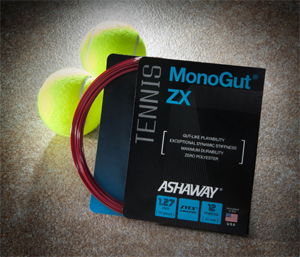|
|
|
Ashaway's Steve Crandall Sees Bright Future for Newer Zyex® - Based Tennis Strings
|

"Ashaway's Zyex monofilament, MonoGut ZX," said Crandall, "has a stiffness rating (that is, power, control and arm-friendliness) in the same range as gut at 106, energy return in the nylon range at 89, and spin potential in the polyester range at 4.4. That's a combination you can't get with any other string." |
Says new Zyex monofilament formulations provide better all-around performance than stiff polyesters
Compares polyesters to "Formula One racers" and "gut on steroids"
Ashaway, RI - In a recent column, Why Zyex® Now, Ashaway string guru Steve Crandall said he understands why professional tennis players have embraced today's high-tech polyester strings, but claims the future belongs to newer, softer playing material formulations like Zyex monofilament. Noting that polyester strings have been called "gut on steroids," he said Zyex strings are much friendlier on players' arms, generate more power than polyesters, and in the latest monofilament formulations, provide spin potential in league with polyester.
"The pro tour has opened its arms to polyester because of its ability to generate spin at very high swing speeds," he wrote. "However, I do not think it's a good idea for club-level players to mimic the pros with these strings. It's like trying to drive a Formula One racer on the street. Polyester can work well for advanced amateurs or club players who have the high swing speeds and good hand eye coordination, but it is counterproductive for most other players. Polyesters are especially bad for junior players because of the dangers to their arms and shoulders from impact shock. Even the pros complain of this."
Citing data from Tennis Warehouse University, Crandall explained that lower stiffness in a string results in more string deflection when it impacts the ball. This reduces impact shock on players' arms and shoulders, and assuming the string has high resiliency, generates more power for the return shot. Polyester strings, in contrast, do not deflect as much, and lose energy and power by deforming the ball. On the other hand, polyester strings have low inter-string friction, which helps generate spin.
"Ashaway's Zyex monofilament, MonoGut® ZX," said Crandall, "has a stiffness rating (that is, power, control and arm-friendliness) in the same range as gut at 106, energy return in the nylon range at 89, and spin potential in the polyester range at 4.4. That's a combination you can't get with any other string."
Crandall said the performance characteristics of this new string material offer benefits to players at all levels. "The first and foremost beneficiaries would be junior and senior players who don't hit so hard—really, any players who have medium to low swing speeds. This is because even at lower swing speeds, MonoGut ZX offers tremendous power and comfort. It's much more user friendly."
"At the club and even the pro level," he continued, "it translates into being able to play a more varied game. These players don't have to just play a base line, hard-hitting, topspin game. They can play more serve-and-volley because of the extremely crisp pace of the ball, and they can modify their swings, using a greater variety of strokes and angles. So it can add a lot of variety to their game. And, of course, it's easier on their arms as well."
Finally, Crandall pointed out that the new Zyex monofilament strings sell for about one-third the price of traditional natural gut, and last longer than most other strings on the market.
|

